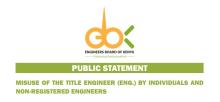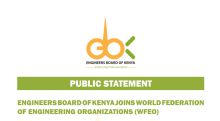General Frequently Asked Questions
For one to practice as an Engineer, one is required by law to register with the Board. This applies to both Kenyan citizens and foreign nationals as well. The registration provides an assurance to the public that one is adequately skilled to take the responsibilities that come with making engineering decisions. A registered professional engineer is issued with a practicing license every year.
Engineers are registered in different categories which include graduate engineer, professional engineer, consulting engineer and accredited checker. For one to be registered as a graduate engineer, one is supposed to have obtained a basic degree in engineering programme that is approved by the Board.Thereafter,one works under the supervision of a professional engineer in order to gain the desired level of experience, maturity of judgement and professional competence as an engineer, whereby he/she can safely assume full responsibility for the engineering works in his charge.Subsequently,a graduate engineer sits for professional interview to be admitted as a professional engineer.
The professional interview / examination is primarily intended to be a means by which the graduate engineer can show that he has achieved the desired level of experience, maturity of judgement and professional competence as an engineer, whereby he can safely assume full responsibility for the engineering works in his charge.
The graduate engineer prepares a professional report which is in two parts;
- A report on experience to date (This aids the examiners form an opinion of the benefit that the graduate has derived from experience).
- An engineering design report (calculations and drawings which are submitted in advance of the interview and are examined in detail by the interviewers. The design report should be relevant and must have been undertaken by the graduate engineer in the course of the training period.
Finally the graduate engineer is required to write an essay on an engineering subject which is related to his/her experience or to a special interest which he/she may have indicated. This is intended to test their knowledge and ability to express their thoughts in writing lucidly, precisely and concisely
There is no age restrictions for registration as a professional engineer. The only requirement is for a graduate engineer to demonstrate that he/she has acquired sufficient skills and professional competence to work as an engineer.Typically,this is may be achieved within two and half to three years where structured training is effected.
Accreditation of a programme refers to the process of assessing the adequacy and relevance of an engineering programme being offered in Universities. The Board assesses the capacity of the University to run the programme based on the following criteria :
- Programme Design : This assesses whether the programme is intellectually credible, coherent and meet national needs, needs of students and other stakeholders. An assessment is made on whether the programme maintains an appropriate balance of theoretical, practical and experiential knowledge and skills.
- Curriculum Design : The criterion for curriculum content assures a foundation in mathematics and basic sciences, a broad preparation in engineering sciences and engineering design and an exposure to non-technical subjects that complement the technical aspects of the curriculum.
- Faculty staff establishment : This criteria ensure that faculty devoted to the programme is large enough to cover, by experience and interest, all of the curricular areas of the programme. It assures that there is a sufficient number of full-time faculty members to ensure adequate levels of students-lecturer interaction, student counselling and faculty participation in the development, control and administration of the curriculum
- Training Facilities and Infrastructure : This criteria ensures that the faculty has suitable and adequate learning venues,libraries,laboratories,workshops,IT infrastructure and all facilities necessary to adequately train competent engineering graduates.
- Duration of training : The Board recommends a training period of five years in Kenyan education system to adequately cover the engineering curriculum.
The Board has published the list of accredited programmes in its website here
The Board does not recognise the awards from unaccredited programmes as sufficient for practise of engineering in Kenya.
Yes. The Board assesses the foreign qualifications to determine the sufficiency for practice in Kenya. Students planning pursue studies outside the Country and wish to practice in Kenya are advised to seek information on the programmes they seek to undertake with the Board first.
This is a new category of engineers introduced by the Engineers Act 2011.An accredited checker is a senior specialised engineer who can be called upon to review the works of a professional engineer. His/her role is to check, with specialized knowledge, any aspect of another professional engineers work submitted to him for checking with particular reference to the safety of the works.


